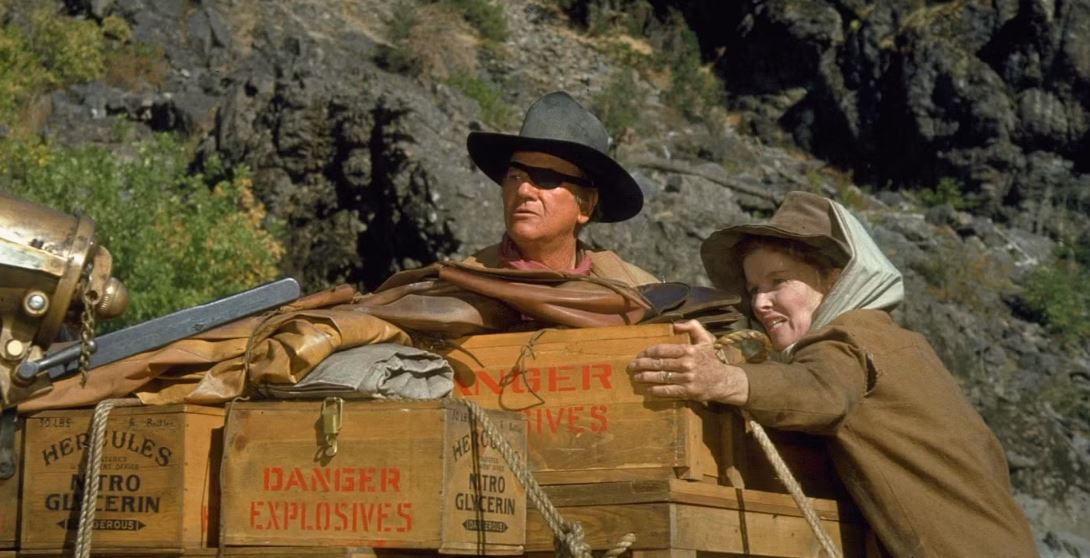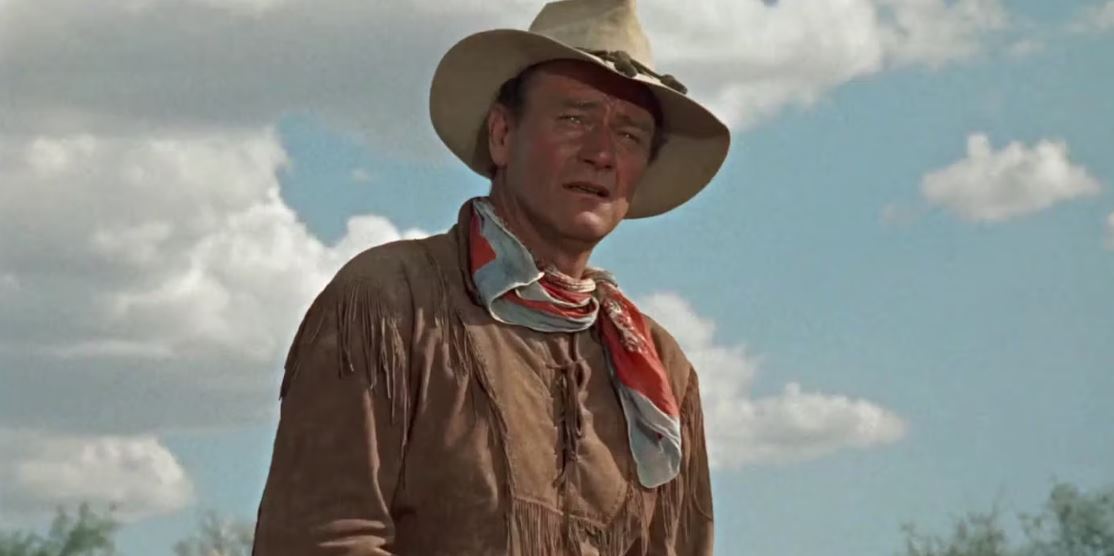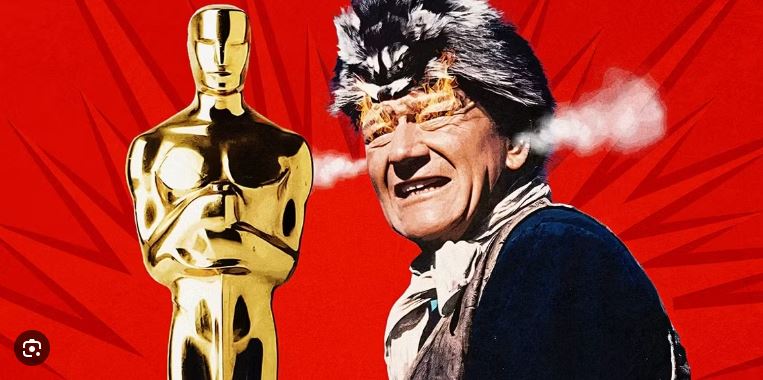In January 2019, John Krasinski recalled how Paul Thomas Anderson taught him an important lesson regarding supporting other filmmakers. Per his own recounting, Krasinski once off-handedly told Anderson about a “subpar” artsy movie he’d just watched. The There Will Be Blood director then gently told this veteran of The Office, “Don’t say that. Don’t say that it’s not a good movie. If it wasn’t for you, that’s fine, but in our business, we’ve all got to support each other…you’ve got to support the big swing. If you put it out there that the movie’s not good, they won’t let us make more movies like that.” If only Anderson had been around in John Wayne’s time to offer such sage wisdom to this Western movie legend. In his time in Hollywood, Wayne was infamous for engaging in mean-spirited rhetoric about other movies.
Wayne’s very public hatred for High Noon (a Western that used its period-setting to critique McCarthyism) was so vivid that he headlined Rio Bravo as a cinematic rebuke to that earlier feature. He also expressed condemnation for Midnight Cowboy simply because its story centered on a pair of queer men, while he lambasted the bleak tone of Clint Eastwood’s Western High Plans Drifter. One especially famous instance of Wayne’s hatred for rival films, though, came at the end of the 1940s, when Wayne lost his first ever Best Actor Oscar nomination to Broderick Crawford’s work in All the King’s Men, a movie Wayne despised with all his heart.
Why Didn’t John Wayne Like ‘All the King’s Men’?

All the King’s Men is a 1949 motion picture directed by Robert Rossen (adapted from an acclaimed novel of the same name), which chronicles the exploits of a southern governor who uses corrupt means to get to the top of the political ladder. Crawford plays the lead role of Willie Stark, the main politician who becomes a microcosm for what endless greed does to a man. Today, All the King’s Men is a bit of a footnote in the history of Best Picture winners, especially since other subsequent victors in this category have tackled similar thematic territory (regarding corruption in American politics) with more vigor and darkness than a Hays Code-era title like All The King’s Men could’ve ever possibly achieved.
However, back in March 1950 (when the 22nd Academy Awards were conducted), All the King’s Men was on everybody’s mind, especially Wayne’s. His lead role in Sands of Iwo Jima had lost to Broderick’s All the King’s Men turn and this cowboy veteran wasn’t taking this development lying down. Per Far Out Magazine, Wayne said on his Oscar loss that “I guess that I am never chosen because the kind of acting which I do is not considered acting by anybody…I wouldn’t have minded losing so much if anyone else had won. [All the King’s Men] smears the machinery of government for no purpose of humor or enlightenment… degrades all relationships… and throws acid on the American way of life.” Wayne didn’t just chastise this Rossen feature for robbing him of an Oscar. He also condemned the project for being “unpatriotic.”
It’s a refrain that didn’t inspire much of a recorded response from Crawford, Rossen, or anyone else involved in All the King’s Men in a high-profile fashion. Perhaps the frequency with which Wayne made these comments about other movies just diluted the urgency of other filmmakers and actors to “defend” their projects. It’s also not a complaint that seems to have alienated Wayne’s relationship with the Academy Awards, as the actor would not only be nominated twice more in his lifetime, but he would finally win a Best Actor Oscar with True Grit two decades after Sands of Iwo Jima. What these comments do reflect, though, is Wayne’s worldview and what constitutes his idea of what makes for “good” cinema.
John Wayne’s Westerns Share a Similar Theme

Across nearly all the movies Wayne criticized in his lifetime, there’s a streak of this actor taking umbrage with how these pictures depicted America or the government rather than their artistic merits. Just look at his complaints about another Rossen feature, the 1959 Western They Came to Cordura, which centers on a plot that challenges the standard concept of “military valor.” Wayne didn’t like this movie for “degrading” the Medal of Honor and his complaints about other titles like High Noon and All the King’s Men are similarly rooted in disdain for movies that dare to question American institutions. While a figure like James Baldwin saw critiquing America as being an obvious sign of affection for the country, Wayne didn’t have time for that nuance. The empathy for other artists that Anderson emphasized to Krasinski in the 2010s was absent in Wayne’s perception of cinema. Art that suggested the government could be corrupt, men could be messy and vulnerable, or America had flaws was not something he had time for.
Comments about movies like All the King’s Men suggest that Wayne had a limited view of what cinema could accomplish or how people could perceive America as a country. When examining his thoughts on projects like All the King’s Men, one can totally see the ideals of a man who would unabashedly support the House of Un-American Activities Committee (HUAC). Of course a guy who believed the U.S. government always does everything right would make The Green Berets, a pro-Vietnam War movie in 1969 or get mad at All the King’s Men for suggesting that American politicians could become corrupted. These views are especially notable because of how much power Wayne wielded in his lifetime in Hollywood. He was not just a random person blabbering about in a comment section online. He was a deeply influential figure whose work with HUAC alone decimated countless careers. Wayne had a toxic worldview that influenced the film industry then and now.
Perhaps that’s why resurfaced racist remarks from John Wayne still inspire so much frustration and rage from people today (beyond the natural response of fury at racist rhetoric, of course). We’re all living in a Hollywood molded in the shadow of this man, with both his star persona and movies influencing modern features of all shapes and sizes. It’s important to consider the larger context of Wayne’s comments about All the King’s Men and how they reflect elements of the pop culture zeitgeist today (such as animosity towards subversive or politically challenging cinema). Wayne’s disdain for All the King’s Men didn’t just encapsulate Oscar-themed sour grapes. They spoke to bigger horrifying trends that moviegoers must remain vigilant of to this very day.
